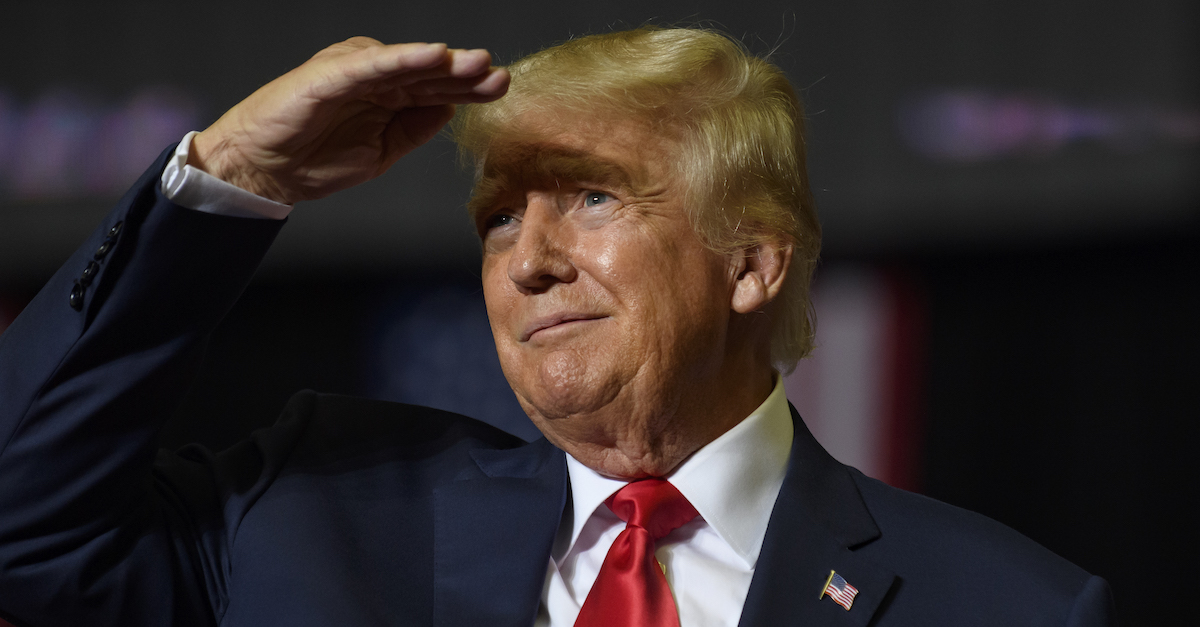
Former President Donald Trump was photographed speaking at a rally on Sept. 17, 2022 in Youngstown, Ohio.
As prosecutors in New York City weigh criminal charges against former president Donald Trump based on a years-old, alleged hush money payment to adult film star Stormy Daniels, reaction to such potential legal action has been a mix of here we go again and “I’ll believe it when I see it.”
On Monday, The New York Times, citing “people with knowledge of the matter,” reported that Manhattan District Attorney Alvin Bragg (D) is attempting to resuscitate the same investigation that previously reached a dead end under his predecessor, Cyrus Vance (D).
That hush money payment, admitted to by former Trump friend, attorney and fixer, Michael Cohen, resulted in a federal campaign finance conviction for the latter – but legally left Trump unscathed. That’s in part, because, under Empire State law, all the DA’s office thought they could prove was that the 45th president committed a minor misdemeanor of falsifying business records when Cohen was reimbursed $150,000 paid to Daniels by Trump’s family business.
“As of this writing, I have not personally spoken to DA. Bragg or any member of his team,” Cohen reacted t0 the Times report. “The Trump-Stormy Daniels saga has been widely reported; including that my actions were done at the direction of and for the benefit of Donald J. Trump.”
A misdemeanor charge against the then-president was apparently not worth the expense and effort. The DA could have only charged business records falsification as a felony offense if the obfuscation was used to coverup or facilitate another crime. In the end, the Times reported, the only thing Vance’s office could come up with was the federal campaign finance violation that Cohen pleaded guilty to – and that connection, the DA’s office thought, was much too tenuous.
The report by Times journalist’s Jonah E. Bromwich, Ben Protess and William K. Rashbaum took stock of the lingering doubts:
It is possible, legal experts said, that Mr. Bragg is pursuing a violation of a New York State election law to underpin a potential case. Under Mr. Vance, the prosecutors briefly mulled using a state election law violation, but rejected it: Since the presidential race during which the hush-money payment occurred was a federal election, they concluded it was outside the bounds of state law.
It is unclear how Mr. Bragg might resolve that issue.
Social media response to the report that Bragg was looking into how the hush money payment might be, somehow, rolled into felony charges for the ex-president – who recently launched his third presidential campaign – was lukewarm. While some connected the report to Trump’s recent 2024 campaign announcement, others doubted much that would come of the many times retold Stormy Daniels saga.
One representative mocking response used with a political metaphor sourced from Charles Schultz’s “Peanuts” comic strip. In a reoccurring joke, Lucy van Pelt holds a football for Charlie Brown to kick. Each time, Charlie Brown swallows his pride, summons all of his strength, and pours all of his momentum in a running effort to kick the football. Each time, however, the football is ripped away by Lucy at the last second – leading Brown to tumble and fall, without fail.
At least one legal expert was similarly skeptical and pointed to a potential issue with charges against Trump stemming from the Cohen prosecution.
“I’ll believe it when I see it,” said national security attorney Bradley P. Moss in an email to Law&Crime. “And statutes of limitation have to be getting pretty tight at this point.”
Former White House ethics lawyer Norm Eisen, on the other hand, reacted to the news by sharing a June 2021 legal analysis that suggested several different ways Trump could theoretically be prosecuted for the payment to Daniels.
“[I]f that falsification were carried over into the Trump Organization’s tax returns—if, for example, it turns out that the payments were intentionally misclassified to reduce tax liabilities—the elements of both business records falsification and tax fraud potentially could be met,” the report argues. “In that event, the longer five-year statute could apply here.”
In response, Moss again raised the issue of the statute of limitations.
In November 2019, it was first reported that Vance’s office was speaking with then-Trump Organization CFO Allen Weisselberg viz. the hush money scandal. The bookkeeper has since turned on the eponymous Trump company and pleaded guilty to tax-related crimes; he recently testified against the Trump Organization in the company’s own trial for those tax-related issues. But, perhaps to key to later developments, Weisselberg has not turned on Donald Trump himself.
The Times report, citing anonymous sources, says that Bragg’s office may try one last avenue to secure the erstwhile money man’s cooperation in an effort to make hay out of the hush money payment – by charging Weisselberg with additional, insurance fraud-related crimes. Those would be insurance charges are wholly unrelated to the hush money payment, according to the Times, and would simply be used as leverage – if they are ever filed at all.
Legal analyst and former litigator Lisa Rubin mused about the potential for charges if such actions are taken against Weisselberg.
“Will NYDA succeed if they need Weisselberg to charge Trump?” she tweeted. “Unclear. He’s been ultra loyal, accepting 5 months at Rikers & exempting the Trumps from the tax fraud conspiracy while their lawyers humiliated him. In exchange, he got paid leave & a birthday party when he pled out. But especially if he was not 100 percent candid at this trial, new insurance fraud charges—and potentially other felony counts for perjury and more—could break the most stalwart of soldiers. Remember also: This soldier might be tough but he’s also 75.”
[image via Jeff Swensen/Getty Images]